Related Research Articles

Archibald Campbell Tait was an Archbishop of Canterbury in the Church of England and theologian. He was the first Scottish Archbishop of Canterbury and thus, head of the Church of England.

Clan Campbell is a Highland Scottish clan, historically one of the largest and most powerful of the Highland clans. The Clan Campbell lands are in Argyll and within their lands lies Ben Cruachan. The chief of the clan became Earl of Argyll and later Duke of Argyll.

Archibald Philip Primrose, 5th Earl of Rosebery, 1st Earl of Midlothian, was a British Liberal Party politician who served as Prime Minister of the United Kingdom from March 1894 to June 1895. Between the death of his father, in 1851, and the death of his grandfather, the 4th Earl of Rosebery, in 1868, he was known by the courtesy title of Lord Dalmeny.

Duke of Argyll is a title created in the peerage of Scotland in 1701 and in the peerage of the United Kingdom in 1892. The earls, marquesses, and dukes of Argyll were for several centuries among the most powerful noble families in Scotland. As such, they played a major role in Scottish history throughout the 16th, 17th, and 18th centuries. The Duke of Argyll also holds the hereditary titles of chief of Clan Campbell and Master of the Household of Scotland.
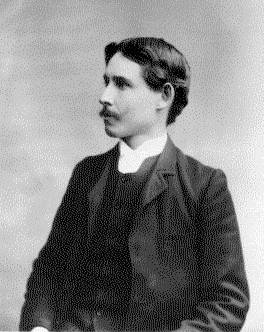
Archibald Lampman was a Canadian poet. "He has been described as 'the Canadian Keats;' and he is perhaps the most outstanding exponent of the Canadian school of nature poets." The Canadian Encyclopedia says that he is "generally considered the finest of Canada's late 19th-century poets in English."
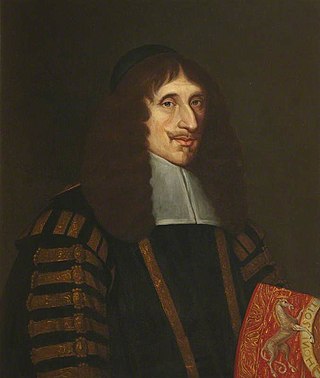
John Campbell, 1st Earl of Loudoun was a Scottish politician and Covenanter.

Archibald Campbell, Marquess of Argyll, 8th Earl of Argyll, Chief of Clan Campbell was a Scottish nobleman, politician, and peer. The de facto head of Scotland's government during most of the conflict of the 1640s and 1650s known as the Wars of the Three Kingdoms, he was a major figure in the Covenanter movement that fought for the maintenance of the Presbyterian religion against the Stuart monarchy's attempts to impose episcopacy. He is often remembered as the principal opponent of the royalist general James Graham, 1st Marquess of Montrose.

Archibald Campbell, 1st Duke of Argyll, 10th Earl of Argyll was a Scottish peer.

Archibald Campbell, 3rd Duke of Argyll, 1st Earl of Ilay, was a Scottish nobleman, politician, lawyer, businessman, and soldier. He was known as Lord Archibald Campbell from 1703 to 1706, and as the Earl of Ilay from 1706 until 1743, when he succeeded to the dukedom. He was the dominant political leader in Scotland in his day, and was involved in many civic projects.
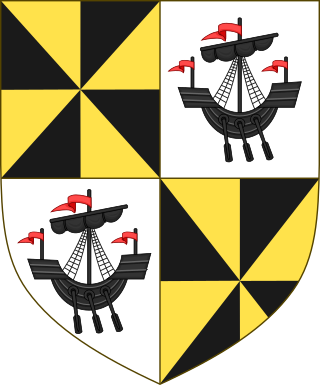
Gillespie Archibald Campbell, 2nd Earl of Argyll was a Scottish nobleman and politician who was killed at the Battle of Flodden.
Archibald Campbell, 7th Earl of Argyll, also called "Gillesbuig Grumach", was a Scottish peer, politician, and military leader.

Archibald Roane was the second Governor of Tennessee, serving from 1801 to 1803. He won the office after the state's first governor, John Sevier, was prevented by constitutional restrictions from seeking a fourth consecutive term. He quickly became caught up in the growing rivalry between Sevier and Andrew Jackson, and was soundly defeated by Sevier after just one term. Roane served as an attorney general in the Southwest Territory in the early 1790s, and later served as a judge on the state's Superior Court of Law and Equity (1796–1801) and the Supreme Court of Errors and Appeals (1815–1819).

John Archibald Campbell was an American jurist. He was a successful lawyer in Georgia and Alabama, where he served in the state legislature. Appointed by Franklin Pierce to the United States Supreme Court in 1853, he resigned at the beginning of the American Civil War, traveled south and became an official of the Confederate States of America. After serving six months in a military prison at war's end, he secured a pardon and resumed his law practice in New Orleans, where he also opposed Reconstruction.

The Hampton Roads Conference was a peace conference held between the United States and representatives of the unrecognized breakaway Confederate States on February 3, 1865, aboard the steamboat River Queen in Hampton Roads, Virginia, to discuss terms to end the American Civil War. President Abraham Lincoln and Secretary of State William H. Seward, representing the Union, met with three commissioners from the Confederacy: Vice President Alexander H. Stephens, Senator Robert M. T. Hunter, and Assistant Secretary of War John A. Campbell.
Lieutenant-Colonel Archibald Campbell, 1st Baron Blythswood, was a Scottish soldier, Tory politician, scientist and Grand Master of the Grand Lodge of Scotland.
Bonnie James Campbell or Bonnie George Campbell is Child ballad 210. The ballad tells of man who has gone off to fight, but only his horse returns. The name differs across variants. Several names have been suggested as the inspiration of the ballad: Archibald or James Campbell, in the Battle of Glenlivet, or Sir John Campbell of Calder, who was murdered.
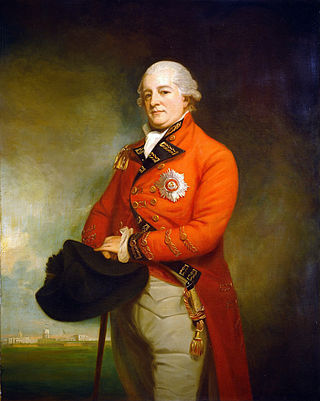
Sir Archibald Campbell KB served as governor of Georgia, Jamaica, and Madras. He was a major Scottish landowner, Heritable Usher of the White Rod for Scotland and politician who sat in the House of Commons between 1774 and 1791.
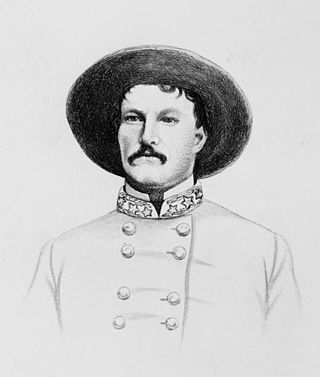
Archibald Campbell Godwin, a brigadier general in the Confederate States Army who was killed at the Battle of Opequon during the American Civil War. Due to his death soon after his appointment, the Confederate Senate never confirmed Godwin's promotion to the grade of brigadier general.
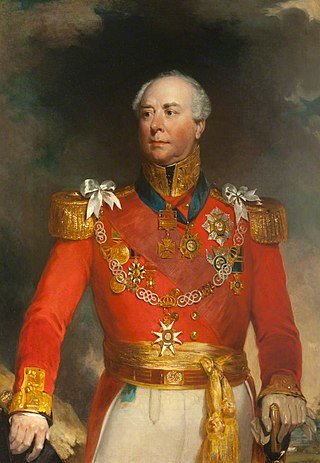
General Sir Archibald Campbell, 1st Baronet was a Scottish soldier who served as an officer in the British Army. From 1824 to 1826, Gen. Campbell commanded the British forces in the First Anglo-Burmese War, the longest and most expensive war in British Indian history, that gave the British control of Assam, Manipur, Cachar, Jaintia, Arakan and Tenasserim. He became known as the "Hero of Ava". From 1831 to 1837, he was the administrator of the colony of New Brunswick, Canada. The Canadian city of Campbellton in the province of New Brunswick was named in his honour.
References
- ↑ "Campbell, Archibald". Political Graveyard. Retrieved 2014-01-26.